While thoughtful, far-future science fiction like Star Trek and time travel romps like Back to the Future a great fun, sometimes we just want to sit down with a brain-twisting piece of hard sci-fi and meditate on humanity’s place in the universe. Since we here at Tor.com are still trying to bat Interstellar opinions back and forth, we thought we’d highlight a few of our other favorite hard SF classics. Bring your space faces close to ours, and we’ll stare into the abyss together!
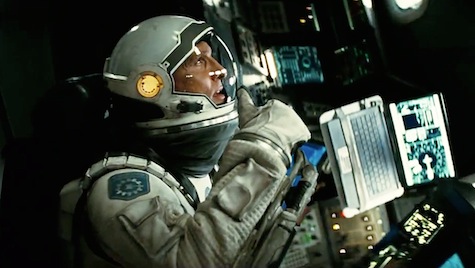
Interstellar (2014)
Interstellar has been causing much conversation about the relative hardness of its sci-fi, because some people have objected to the quasi-mystical mention of love and 5th dimensions, but we think the scientific aspects were pretty extraordinary. Modeling the black hole for the film actually cause physicist Kip Thorne to rethink his theories on black holes, and relativity was used in a fascinating way to tie abstract scientific theory to human consequences and emotions. Coop’s physical journey was harrowing, but his psychological one was grounded enough in his character that it won most of Tor.com over. And thus the McConaissance continues.

Contact (1997)
This one also deals with fathers and daughters, and wormholes, and McConaughey’s drawl is used to great effect. Jodie Foster plays Ellie Arroway, (the WASPiest astronaut ever) who works with SETI and becomes obsessed with a transmission that may mean alien life is trying to talk to us. She’s selected to make first contact, and uses wormholes to travel to the star Vega.
Carl Sagan began working on the ideas for Contact in 1979 with his wife, Ann Druyan, and producer Lynda Obst (who later produced Interstellar!). Also like Interstellar, Sagan used Kip Thorne’s work on wormholes to facilitate Ellie’s space travel. This one also wrestled with the relationship between potential alien contact and religious and philosophical thought. Contact won the Hugo Award for Best Dramatic Presentation, and movie won Saturn Awards for Jodie Foster and Jena Malone’s performances.
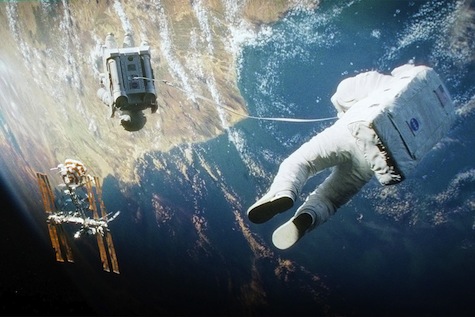
Gravity (2013)
So here’s a scenario: You’re a biomedical engineer (Note: NOT an astronaut) and you are on your first-ever trip into space! You can’t quite get the hang of life without gravity, but you do your best as you make upgrades to the Hubble Space Telescope. But then a series of accidents cause a domino effect that wrecks your shuttle, kills your companions, and leaves you stranded alone without even enough contact with Houston to tell them you’re not making it home. What would you do? Sandra Bullock’s Ryan Stone spends the full running time of the film fighting against the cold indifference of the universe. Gravity uses the extreme hardship of life in space to highlight emotional issues, in this case Stone’s grief for her daughter, which has resulted in her choice of a solitary life. Now that she faces death alone, she has to reassess whether she wants to continue living at all, and why.
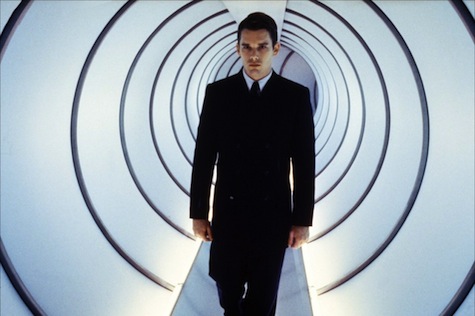
Gattaca (1997)
Never save anything for the swim back! Gattaca is about a future society where class status is determined by your DNA, which is pre-programmed through a complex system of eugenics. This causes some problems for our hero, Ethan Hawke, who was born through natural conception. But young Ethan has a dream and that dream is space! So he borrows some genetic material from Jude Law to try to fake his way into a space program. This film is particularly interesting because you get two hard sciences instead of just one! It takes a probing look at a genetically-obsessed society, and then swings straight into space exploration.
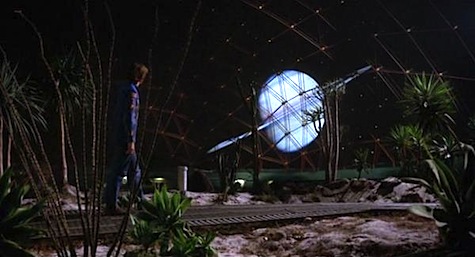
Silent Running (1972)
This fantastic piece of sci-fi inspired MST3K (and for that alone it should have monuments built to it) and also influenced both Wall-E and Moon. Directed by Douglas Trumbull, one of the effects creators for 2001, the film evolved from a story about a man fleeing forced retirement into one of ecological preservation. Freeman Lowell is one of the caretakers of the Valley Forge, a biodome that houses plants and animals from Earth, which has been ravaged by pollution. The crew receives word that they’re supposed to nuke the domes and return the freighters to Earth, where they’ll have a more commercial use, but Freeman goes rogue, programming his three drones (called Huey, Dewey, and Louie) to help him.
As Chris Lough discusses in his Interstellar review, much of sci-fi is about the tension between the caretaker and the explorer. Here, the two roles merge when Freeman attempts to rescue the forest and animals under his care, while heading deeper into space to escape the destructive governments back home on Earth. And, like many of the films on the list, Silent Running is not afraid to dwell on what happens to the human spirit when it’s alone in the vast expanse of space.

Dark Star (1974)
A crew of typical John Carpenter heroes sails through space in the Dark Star, on a mission to blow up unstable planets. This is not as mindlessly destructive as it sounds however: at this point in humanity’s evolution, we’re able to travel and colonize far beyond Earth, and the Dark Star is attempting to preserve habitable planets. Unfortunately, the crew has all gone slightly crazy after their decades stuck together in the ship (Talby, for instance, spends most of his time in an observation bubble watching space fly by) and the ship itself is slowly falling into disarray. When Dark Star is hit by an electromagnetic ray, one of the ship’s AI “Thermostellar Triggering Devices” decides it’s supposed to deploy—whether or not it’s been dropped on a planet. The crew finds itself in the tough position of explaining phenomenology to a pissed-off sentient explosive.
The star and co-writer, Dan O’Bannon, later reworked some of Dark Star’s original script into the straight horror that became Alien, and the film’s hyperspace sequence inspired the one used a few years later in Star Wars. Dark Star won a Golden Scroll (later renamed a Saturn Award) for Best Special Effects in 1975.
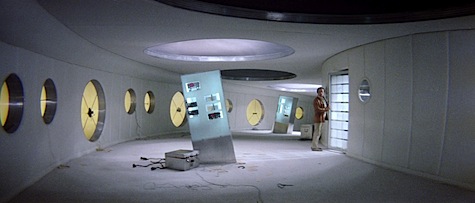
Solaris (1972)
There are only three scientists left in the station that orbits the ocean planet Solaris. All research has ground to a halt, and even though they’ve been there for decades, only vague and confusing messages are transmitted back to Earth. A psychologist, Kris Kelvin, is chosen to travel to the station to try to diagnose the problem, and help them if possible. However, he soon finds himself slipping under the same meditative spell as the others…
Stanislaw Lem’s novel Solaris was originally published in 1961. Andrei Tarkovsky, a bright and chipper Russian filmmaker, diverged greatly from the novel—his film focuses much more on Earth, and on the psychological impact that space travel has on an Earthling, while Lem’s novel is a meditation on the difficulties of communication, both between Earthlings and aliens.
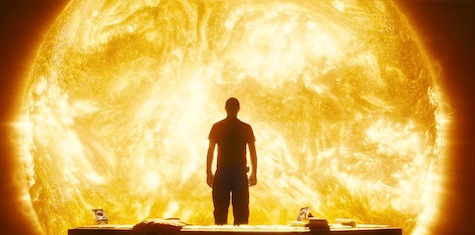
Sunshine (2007)
The year is 2057. The sun is going out, threatening Earth with extinction, and humans have to make a last ditch effort to save life. After the first effort, helpfully named Icarus I, disappears, they send a team including Cillian Murphy and Chris Evans up on the Icarus II. (Come on, Sun! If Chris Evans asks you to do something, you should do it!) Naturally, once they get close to the sun, many psychological shenanigans ensue.
While the basic premise of the film is a bit off, as the sun will probably only die out in about five billion years, and will explode into a red giant rather than slowly guttering out, the filmmakers worked to make sure that the rest of the science worked. Murphy, who plays fictional future physicist Robert Capa, worked closely with real-life physicist Brian Cox to make sure his portrayal was accurate. The cast and crew attended lectures in solar physics given by Cox.

Moon (2009)
Oh, Moon. We love this one. I mean, the odds are stacked in a movie’s favor when Sam Rockwell’s playing multiple roles and David Bowie’s son is the director, but even taking that into account this one was extraordinary. This film centers on Rockwell’s Sam Bell, who is a one-man helium-3 mining expedition on our Moon. You start off thinking it’ll be a space story a la Gravity – Sam Rockwell is due to go home, and something’s bound to go wrong, or else there’s no movie, right? Possibly GERTY, the helper robot voiced by Kevin Spacey, will be involved? He sounds kind of evil… But Moon subverts all of those expectations! The AI is lovable and helpful throughout, and allies with Bell against his corporate programmers, and the film turns into a heart-wrenching exploration of identity and mortality.
So that’s it! What do you think? Did we miss any?
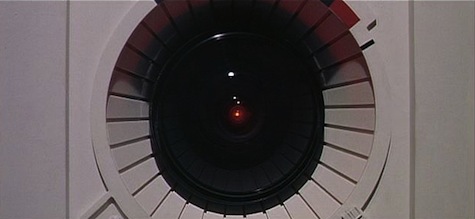
I can’t help but feel like we missed one….
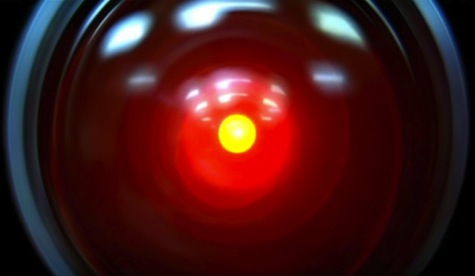
Oh, oh yeah! Ha. Yeah. That’s a big ‘un.

2001: A Space Odyssey (1968)
This one sets the standard for all space films that come after it. There is no way to overstate its importance to sci-fi, or to the history of cinema. Stanley Kubrick gave us a film that reaches back into humanity’s past, and theorizes about its future, but even that is just a frame story for his mediation on the nature of consciousness itself. And obviously, 2001 is in the DNA of every preceding film on this list: even the simple fact that many of them take place near Saturn is telling, as the Jupiter voyage in 2001 was initially supposed to be a journey to Saturn; when Douglas Trumbull couldn’t create a good rendition of Saturn’s rings they switched to a more easily created planet. He kept working on the effect, though, and was able to feature Saturn in his own Silent Running a few years later. Interstellar‘s use of Saturn is one of the (many) homages to Kubrick’s masterpiece. The examination of the the loneliness of space, the exploration of relativity, the questions about what makes a human truly human, and whether a machine can gain consciousness as we understand it — it’s all in there. And you could also argue that the uneasy conversation between spirituality and science that weaves through most of the above films was encoded by the appearance of a certain Star Baby… but that’s a whole other essay.
So…that’s really it! Did we miss any of your favorites?











I still need to thank Tor for introducing me to Moon a year or two ago. It’s my absolute favorite film in any genre.
You absolutely missed a great one with Forbidden Planet from 1956.
This was an excellent story exploring the consequences of massive alien power under the control of a human subconcious.
This movie also introduced the most durable robot of all filmdom, Robbie the Robot, which has appeared in numerous movies and TV productions.
… Hmmm. So here’s a challenge: A hard sci fi movie that doesn’t involve space travel.
Anyone?
The Andromeda Strain.
Yes! Totally. I’d forgotten that one, but you’re right. (Haven’t seen the movie, but have read the book.)
Hmmm. Is the line as clear, WRT stories not involving space travel?
I’ve been meaning to give Sunshine another go since it came to DVD, but this article just makes me want to watch Moon again and again…
Hey guys you put the following line in twice at the end –
as the Jupiter voyage in 2001 was initially supposed to be a journey to Saturn; when Douglas Trumbull couldn’t create a good rendition of Saturn’s rings they switched to a more easily created planet.
Dark Star and Interstellar are on my to-do list, I promise! Everything else I heartily agree with.
What about Primer? Primer is hard up to a point, wouldn’t you say?
I love both Sunshine and Gattacca an unreasonable amount. I still remember freaking out in my high school biology class when we learned the nucleobases. I literally stood up and shouted “Gattacca!” and Mr. Maskrey looked at me like I was insane.
I was unimpressed by Moon initially, because I figured out the twist really quick. Later, I mulled it over while walking the dog and gave the film another shot. When I wasn’t so concerned with figuring out what was going on, I could be amazed by the acting and the way that Jones told his story. I have seen the error of my ways.
cythraul, how about THX1138?
Europa Report Scientifically superior to a lot of this list, and a well-told, well-acted story.
@8.
Oooh, “Primer” is a good one!
Hmmm. Do we need to revisit the overall line between hard and soft sci fi?
(Do we want to, or is that a whole Can Of Worms?)
@9.
I would totally call THX1138 hard sci fi.
@@.-@ Excellent choice. I’ve always appreciated THE ANDROMEDA STRAIN (the 1971 version) for its realistic depictions of scientists at work, something seldom if ever seen in movies before then.
A bit of SILENT RUNNING trivia: the soundtrack music is by Peter (P.D.Q. Bach) Schickele, in “serious composer” mode for a change.
Andromeda Strain definitely belongs on this list; great movie, great example of how science actually works.
I’ve never heard of several of these movies but they all sound really intriguing!
Primer! So, so good. I actually haven’t seen Europa Report yet – I’ll need to add that one to my list…
I would add Love (2011), directed by William Eubank. It’s similar to Moon in some ways, and I actually thought there were a number of connections between it and Interstellar as well. It’s a small indie film that few have heard about, but it’s on Netflix, and it is very good (if you don’t mind a quiet, slow, thoughtful SF).
I’m partial to Robot and Frank, myself. I’m not sure if it counts as hard SF, but I don’t think it strays too far into fantasy.
Is Dark City hard sci fi? One of my favorites in any case. Forbidden Planet is a favorite and the first sci fi movie I remember really liking.
How about “Destination Moon”? It’s emphasis on private funding of space exploration would fit with current thinking.
I was reading the article and wondering where The Andromeda Strain was, then I got to the comments and saw it had been mentioned several times already. I think I love you guys.
Marooned (1969). Not a great film, it’s an okay watch on a rainy day. Probably had a lot of influence on Gravity.
How bout Outland with Sean Connery (1981)?
Its a re-envisioning of the western High Noon and besides the gunfights, it’s very focused on depicting what seems like a fairly realistic mining settlement on the moon and its technological and social difficulties. Even the action mostly revolves around people using the environment (often the vacuum of space or some knowledge of the station structure) to their advantage. Well OK a lot of the time it’s just Sean Connery getting people sucked out into space where they explode, but still ..
Anyway I’d like to see somebody try to do the mother of all hard scifi – Rendevouz with Rama – as a film. Kubrick would have probably done a good job with it but alas.
What about District 9? Science wasn’t explained, but it felt like hard SF to me. Or Close Encounters? It was pretty realistic for what it was portraying.
For hard sf where space isn’t involved, The Man from Earth qualifies, I think. And The Quiet Earth.
@22
While people exploding if exposed to vacuum is not entirely accurate, Outland scores some points for noting that it takes a very long time to travel from Earth to Jupiter.
I’d have to disagree that many, if any, of these count as “hard science”. Certainly not Dark Star, Contact is so far out there it’s hard to even see the science (and Contact is one of my favorite movies, ever!), and Gravity can’t even get orbital mechanics right. And 2001? One of the best movies ever made, in any genre, but where is the hard science? It’s all very vague and mystical.
I agree that The Andromeda Strain is a much better example.
@12: Peter Schickele was always a serious musician. He just had this urge to popularize the rather odd works of P.D.Q. Bach.
I’m surprised no one has mentioned Blade Runner. Or Clockwork Orange.
Children of Men was devastating although it was only one long chase.
In this article it’s like you want to define hard SF as something that feels sciencey and technical even if it’s fantasy. Sticking to the scientifically real would cut out half the movies on your list.
Well, there WILL be “…and miles to go before i sleep.” in 2015, but it’s a work in progress. ; )
(Shameless plug accomplished.)
Regarding hard science, non-space films, one of my favorites is Pi. I almost get a headache watching it, and I believe that was the director’s intention.
I also like pie, but that’s something for a different thread…
All of the P K Dick stories that were made into movies(Blade Runner, Minority Report, etc) as well as Bradbury’s Martian Chronicles(I know it was a mini series but…) and A Sound of Thunder, the various Star Trek movies and two of my favorites The Man Who Fell to Earth and The Quiet Earth(although almost no one has seen it).
You’ll all probably hate me for suggesting this but I’ve always thought that the original Star Trek: The Motion Picture is a pretty good hard Sci-Fi movie. It’s a TERRIBLE Star Trek movie, but really good as hard Sci-Fi.
While it doesn’t use the science you’d find in a laboratory, I was impressed with how Jerome Bixby’s The Man from Earth put a solid SF idea through its paces without flashy effects (indeed, only those who deal in effects professionally would likely be the ones to notice any). As with Primer, the magic lay in the writing and the performances.
Late to the game here. There are many reasons why this movie is bad, all of them having to due with its very superficial and juvenile presentation of human beings as, erm, human beings (da guy from Brooklyn musta been rekkinized as a stereotype even in dat time, fir example), but for its day Destination Moon got the science as it was then understood nearly right.
No one mentioned Logan’s Run. Love the Adam and Even post apocalyptic tale. Plus when I was twelve I thought the “Circuit” had to be the greatest invention ever.
How about Total Recall (the original)!!! Hahaha, maybe not hard enough. Seriously though, Terminator and Aliens were great, but one did require time travel, and the other had unexplained intersteller starships. But the weapons in Aliens were the most accurate near futuristic armory I know of.